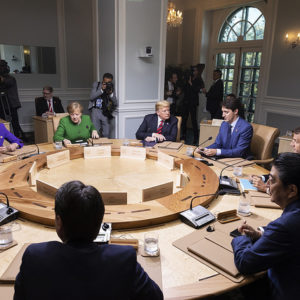For decades, American presidents from John F. Kennedy to Ronald Reagan to Barack Obama have spoken about America as a shining “city on a hill” — a beacon of hope and opportunity for the world as a nation built upon fundamental freedoms, respect for the rule of law and human rights. The Trump administration’s actions recently, however, suggest that beacon may be fading.
In the span of days, the U.S. government picked fights with close allies and opposed language supporting a “rules based international order” at the G7, declared it would not accept individuals fleeing domestic or sexual violence seeking asylum, and praised North Korea’s brutal dictator before offering to halt military exercises and withdraw from the Korean Peninsula in exchange for a promise to denuclearize. It seems “America First” places our values last.
The United States led by President Trump is more comfortable with a brutal dictator than democratic allies. In recent weeks, Trump praised Kim Jong Un, the totalitarian leader of North Korea, stating that it was an “honor” to meet him and calling him “very talented.” Meanwhile, he assailed Canadian Prime Minister Justin Trudeau, calling him “very dishonest and weak,” and attacked German Chancellor Angela Merkel, claiming Germans are “turning against their leadership.”
While Trump’s message to the world is that the United States has better relations with North Korea than with Canada, his administration has announced policies that the threat of domestic violence and gang violence is not grounds for asylum in the United States and defended its cruel and inhumane practice of separating children from their parents at the border.
None of the actions the United States has taken in recent weeks reflect the shining “city upon a hill” that past presidents have described or the values that have underpinned America’s worldview. The United States’ relationship to its values is about more than soaring rhetoric — they are central to America’s ability to lead.
The United States has long been a force for good in the world — driven by its core values in fundamental freedoms, respect for the rule of law, and human rights.
America put war criminals on trial following World War II, rebuilt Europe and sent aid to Asia. Both Democratic and Republican administrations have recognized America’s ability to positively engage the world — just two recent examples include the President’s Emergency Plan for AIDS Relief program, championed by President George W. Bush, and President Obama’s coordinated response to the Ebola outbreak in West Africa, which saw the United States galvanize global efforts to stop the spread of the disease.
Now, America’s ability to be a force for good in the world may be at risk. Not only will U.S. diplomats have less credibility to urge international counterparts to uphold human rights but they will also be less able to marshal support for American national security priorities. If there is to be a new Iran Deal, U.S. diplomats will face a much tougher international environment — relations with European allies are already strained and they are less likely to follow a United States that is perceived to no longer strongly share its values.
Additionally, if America is not championing its core values, it is much more difficult to persuade others to follow our lead rather than others’. Nations may consider the United States to be just as transactional as Russia and China.
Similarly, as the world watches thousands of families separated at America’s southern border and children being held in tent camps, dissidents, freedom fighters and civil rights leaders around the world may no longer wish to follow America’s lead.
It is true that the United States has fallen short of its ideals in the past. American history is full of moments when the United States was less than its best self. Nevertheless, it is difficult to recall a time when the United States has acted so openly dismissive of its core values, ready to fight with its democratic allies and embrace brutal dictators.
If the United States is to maintain its leadership position in the world — and continue to be a shining “city on a hill” — it must remember that America’s values are the source of its strength.

